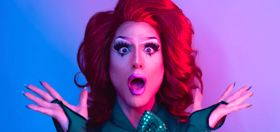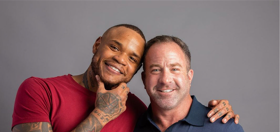 Opinionated author and occasional media critic Dan Savage is not the first gay activist to be labeled “transphobic” for his use of the word “tranny,” but he is certainly the first to be labeled such for using the word “tranny” in an actual discussion about the current policing of the word “tranny.”
Opinionated author and occasional media critic Dan Savage is not the first gay activist to be labeled “transphobic” for his use of the word “tranny,” but he is certainly the first to be labeled such for using the word “tranny” in an actual discussion about the current policing of the word “tranny.”
That’s right. Dan Savage visited the University of Chicago Institute of Politics this week, where according to The Chicago Maroon, he “began discussing his personal history as a gay man” and had used the word “tranny” in “an anecdote about reclaiming words.”
A freshman “member of the LGBTQ community” who asks only to be identified as Hex says Savage’s use of the word “tranny” made it feel “unsafe,” and that one of “the most hurtful parts” of the conversation was when IOP fellow and Guardian columnist Ana Marie Cox, participating in the discussion, echoed the word. “I used to make jokes about trannies,” said Cox, according to Hex. (“It” is Hex’s chosen pronoun.)
Students recall that Hex interrupted the conversation from the audience to demand that the term “T-slur” replace the word “tranny” in the ensuing discussion, claiming that their use of the word was “to threaten me and make me feel uncomfortable in that space.” A dialogue between the three created “a tense atmosphere” and Hex reportedly left the room crying.
How about we take this to the next level?
Our newsletter is like a refreshing cocktail (or mocktail) of LGBTQ+ entertainment and pop culture, served up with a side of eye-candy.
IOP Executive Director Steve Edwards offered the following recollection to add some context to the situation:
“Fundamentally what the conversation was about was language. One argument is that language and certain terms can be so hurtful that no matter the context, no matter the person using them, they should not be invoked, period. The other argument was that language can be reappropriated—hurtful language can be re-appropriated by groups that are directly affected by the language—and used to empower and that there’s a tradition of that.”
Citing the experience as “dehumanizing,” Hex immediately began circulating a petition to force the University of Chicago to apologize to it and “prohibit the use of transphobic slurs” at future events. The petition garnered over 1,700 signatures.
In response to the petition, the IOP released the following statement, pointing out that it “cannot remain true to our mission and be in the business of filtering guests or policing their statements“:
The IOP has not endorsed the viewpoints or statements of any of the more than 250 guests we already have brought to campus from across the political spectrum. By definition, views will be expressed on occasion with which some will strongly disagree or even find deeply offensive. But we cannot remain true to our mission and be in the business of filtering guests or policing their statements to ensure they will always meet with broad agreement and approval and will not offend.
Last week at a Fellows seminar, a guest used language that provoked a spirited debate. The speaker was discussing how hurtful words can be re-purposed and used to empower; at no point did he direct any slurs at anyone. We acknowledge that some students found the discussion personally offensive and applaud them for strongly challenging the speaker, which was absolutely appropriate. To exclude or sanction him would not have been.
Maroon columnist Anastasia Golovashkina also investigated the claims and offered the following opinion in a column titled “A Less Savage Perspective“:
For one, it is disingenuous for the petition’s authors to allege (in some, though not all, of their conflicting, seemingly ever-changing statements), that students had been repeatedly interrupted by Savage and Cox at the seminar, or not given ample opportunity to voice their concerns. In the few instances when Cox and Savage did interrupt students, they did so only to request permission to finish their sentences—only because they had been interrupted by the students first. Near the end of the seminar, Cox even made a point to ask the petition’s only author still in attendance whether she felt like she had been heard. Her answer? “Yes.”
It has been even more disingenuous for the students to repeatedly modify their petition’s pre-“update” language without notifying signatories, and to delete an astonishing number of their own and others’ public comments about the incident on social media. Having actually attended the seminar and observed countless inconsistencies between their descriptions and reality, I am taken aback by how many of my peers would sign such a strongly worded petition on the basis of incredibly minimal, misleading information. Even one of the petition’s own authors did not attend the seminar, opting to instead compile a litany of out-of-context quotes from Savage’s decade-old columns for a co-author to recite in their absence.
….
I believe the approach these students are taking is unfortunate, questionable, and destructive. It is akin to transforming important, under-discussed topics into minefields—mines that even LGBTQ allies will, and already are beginning to, fear setting off too much to even broach the subjects. If this is the sort of response speakers and attendees can expect at any kind of event about LGBTQ issues on our campus, even allies will be reluctant to participate. Indeed, such reluctance is already setting in. In the aftermath of the seminar, I have heard many of my peers express concern about being branded transphobic, and thus avoid discussing trans issues altogether. I share these concerns, and realize that I open myself to a great deal of criticism by discussing such issues in this piece.
Productive dialogue will always be inherently messy and imperfect. Particularly on issues where we’ve made far too little progress like trans rights, it is crucial to keep having these conversations—to keep inviting dialogue and disagreement, in and in so doing, to promote progress and understanding.
The only understanding that censorship promotes is an understanding of topics to categorically avoid. But censorship and ignorance are not the answer. Dialogue is.
The petition page seems to have only favorable remarks published.



















DB75
Sounds as if to me there are some people being WAY too sensitive. Sure, there is a lot of hatred out there – but come on! Not everyone is your enemy!
I agree that this sort of thing will backfire against the trans community. If this sort of thing continues, I fear that the trans community will be left with few supporters willing continue a fight for their full equality.
It’s getting to the point that people become afraid to speak their opinions or minds for worry that they will be labelled as a hater or worse. That’s a very dangerous road to travel.
newfoundma
This student is being ridiculous. When trans allies like Dan Savage can’t talk about a controversy without upsetting someone, it is time to grow a thicker skin. Anyone who signed this petition is going to be ill prepared for the real world.
john.k
@DB75: I totally agree with you. People need to get a grip and recognise who the real enemies are. If friends are labelled transphobic or whatever it’s not going to help transgender people.
Nowuvedoneit
The student Hex also wanted to be addressed as it.
hex0
Sick of transsexual histrionics and crocodile tears. It’s really all starting to piss me off.
Can we tell trans to fuck off and leave gays alone yet, or must we continue to grovel at their feet?
gskorich
this is getting out of hand. why did HEX show up to a lecture on this subject if it was so life threatening.
robirob
It comes down to: How is the word used (in what context and with what intent) and is the one using the word an ally or an enemy of the LGBT community?
Quite frankly I don’t think some people choose their battles and/or battlegrounds wisely.
Zodinsbrother
The trouble about crying wolf is that people stop listening when you have something really important to complain about.
They need to get a grip.
Lvng1tor
This is a perfect (as far as I can tell from this story and others online) example of the difference between Thought/moral/word police and people who would ask that certain words not be used or recommend they not be. The latter group will dialogue keeping communication open and a learning environment. The first group are low self esteem with superiority complexes who believe that they and only they are correct and anyone disagreeing with them is bad.They are justified in in all means they take to achieve their end. Just like when people who use slurs just to get a rise out of people. I truly believe that most people on both sides of the subject are open to talking it out. Dialogue is the only way we make progress
Lvng1tor
It’s important to remember also that “HEX” and her friend are just 2 people and do not represent all Trans activists.
Qjersey
It sounds like a person with issues…who reads the blogs of the t-slurs who are on the attack.
michael mellor
I agree with the transgender community on this issue. Unless you have walked a mile in the shoes of those who are transgender, you have no right to use derogatory terms to describe them. All too often, gay men think they can say anything rude about others.
alphang
Good god get a grip It.
This is just a load of overdramatic f*ckery. I know there’s always going to be someone somewhere out there who’ll be offended by any given thing, and I know it’s wrong to rule someone’s true feelings as overdramatic, but MY GOD. There really has to be some sort of boundary between healthy outrage and touchy, farcical outrage.
Cam
This is actually starting to sound like a very well planned out concerted effort from the Trans fringe to attack well known members of the gay community.
I stated early on that we would be able to tell if this was a legitimate issue if, after Logo stopped using the words they stopped attacking RuPaul. But they didn’t. Logo did everything they wanted and yet they continued attacking.
This seems to be less about any issues with the word and more about the Trans fringe once again feeling that the gay community is their enemy rather than the right wing bigots.
hex0
@Cam:
Gay people are an easier target than going after the people who are actually harming trans; right-wingers, christians, politicians and violent straight lunatics.
jar
Hmm. Hex is made to feel unsafe by the mere utterance of the word t-anny, but refers to him/herself as it? Now, that’s unintended irony. It is the most dehumanizing epithet one can throw at another; it strips the object of all humanity. Also, it is also a term that has been used as a slur against transgendered people. Hex appears to be just another of the internet-raised who has learned to use certain buzz words to try to gain the upper hand. Shame on it!
The good news is that both the school and the paper recognized this crie d’attention for what it is: a revelry of victimhood.
In this recent brouhaha over transgender language, it is important for all of us to bear in mind that there are far more transgendered brothers and sisters who struggle to live a free life than there are drama queens prostrating themselves over the innocent use of words. Let’s not make lives more difficult by conflating the two.
Sansacro
@michael mellor: Lost me with your last sentence.
Desert Boy
This is too exhausting for me to keep up with.
Jimi
@DB75: refer to the Jayne County story on the front page for the ultimate statement on all this..
tricky ricky
we need the total and complete separation of the gay and transsexual movements. gays and lesbians are happy with who they are and the bodies they have. transsexuals are unhappy and want to change. let them go their own way.
Desert Boy
@tricky ricky: – Yep. Never felt that way until they attacked Ru Paul — of all people. Now, they need to shown the door.
Jacob23
Lol! “Hex” prefers the pronoun “it” and feels “unsafe” because 3 adults are discussing their use of a word years ago. Obviously, there was real danger present. I am surprised it didn’t call 911.
We need to accept an unpleasant truth: Many transgender activists suffer from mental illness. Activism is way for them to deflect their attention away from their illness. It also feels good to be in the judge’s seat. When you are sitting in the judge’s seat, you don’t have to ponder your own life and your own conduct. So trans activists judge and attack others for perceived slights. But the supply of slights never matches the demand, so they have to be manufactured. That is how “t**nny” went from a term of common usage among transfolk to a disfavored term to a slur so powerful it brings danger every time it is uttered.
These attacks only provides them psychological relief when the targets of their bullying cower and apologize. That is why they rarely if ever attack a Pat Roberson or a Bryan Fischer. Those guys couldn’t care less about Hex or online petitions, so the trans activists get no pleasure attacking them. Instead, thy attack LGBs and progressives, such as Dan Savage, Neil Patrick Harris, Piers Morgan, Jared Leto, gay filmmaker Diego Luna, etc. These are decent people who are likely to instinctively apologize no matter how ridiculous the attack. Just what these unbalanced trans activists want.
The best thing LGBs can do for ourselves and for Ts is to end LGBT. It is not a valid concept. It demeans both groups. And it links LGBs with the mentally unbalanced trans activists.
Cagnazzo82
Transsexuals didn’t lead the gay rights movement. Rather it appears they’re misappropriating it.
If they want their own separate group outside of LGBT then no one’s going to stop them.
This is all getting quite silly as far as I’m concerned. If you’ve reached the point where you’re fighting your ‘civil rights’ and PC battles against other gays and drag queens (of all people), then perhaps your battle for equality might’ve long hit a snag and totally lost any valid direction or relevance.
Jacob23
BTW, many of the names on that petition look totally fake. There’s one from a dude named Lecocque. Another one lists his address as “Town, CA”. And other from “Renco van der Tang” And quite a number of others from people with suspiciously glamorous-sounding names. Pretty obvious that a dozen or so trans activists signed it with hundreds of fake names. Many trans activists are unemployable in real life, so they have the time.
Cagnazzo82
@hex0: Exactly. That about sums it up.
When your problems are too big you sweat the small stuff.
I equate it to pro-marriage groups going after gays, rather than targeting straights to cheat on their spouses, or divorce and marry multiple times, sham or shotgun marriages on a whim and so on. Actual issues that threaten straight marriage 100 times more than gays getting married ever will.
That’s the same with trans people going after other gays and drag queens (the latter of which I still can’t wrap my head around).
They’re going after easy soft targets that aren’t really a threat to them (and in many instances are actually on their side)… while avoiding the bigger issues actually facing the trans community and and maybe facing younger trans kids growing up in a society that looks down upon the way they feel inside.
That’s where the real fight and cause should be. Not with gay allies and drag queens using a word that’s been a part of queer culture/terminology for decades.
It’s so absurd this entire non-issue.
corvaspikenard
@hex0: Please don’t paint the entire community as something based on the actions of one person. The vast majority of us want nothing to do with the likes of ‘Hex’ and its brand of tumblr activism.
Hex should be in therapy to learn some skills for coping with hearing ‘bad words’, not out collecting signatures.
corvaspikenard
@Jacob23: There are plenty of mentally unbalanced LGB activists too. It would make more sense for the LGBT to distance itself from mentally unbalanced activists in general 🙂
Throbert McGee
@Cagnazzo82:
The trans claim is that when non-trans gay men do drag shows, it’s sort of like 19th-century white performers blackening their faces with burnt cork and crooning:
“Dat’s whar I’s labored so hard fo’ ol’ Massa
Day after day in de field ub yaller corn;
No place on earf does I love mo’ sincerely
Dan old Virginny, de state whar I was born.”
So I can see where they’re coming from, even if they’re oversimplifying.
Teeth
I am now committed to using that word as often as possible. It used to be a word that we used when watching Ru, or when going to a bar/party that we like. Now I am dedicated to using it several times a day.
gskorich
@Throbert McGee: it’s called female impersonation. it’s not race impersonation. these people are really stretching.
Cagnazzo82
@Throbert McGee: It’s a completely misplaced analogy however.
Because people aren’t doing drag to mock trans people.
They’re doing drag to celebrate pseudo version of a glammed-up woman.
The most famous drag archetypes imitate actual famous women… Cher, Madonna, Liza Minelli etc…
I see it as yet another misappropriation of language to either try to compare drag that to blackface, or try to frame that form of entertainment as being offensive specifically to trans people. It’s not even about them at all in that instance.
faggot
Mmm. Yeah very little of this issue, if anything, has to do with attacking Dan Savage, or labeling him as transphobic. And truthfully, if it had been a straight person up there and they’d said faggot or dyke, most of you probably would have reacted the same way.
Also that website only has positive comments about the petition because the way that site works is that all the comments by default are from people that signed the petition.
You all have let freedom make yourselves sluggish and stupid, showing a crass loyalty to members of the LGBTQ community who have turned us into little more than a sideline show for the heterosexual majority. If you make the decision to disengage from members of your own community and separate this movement from your own in some foolish attempt to preserve your own preconceptions of an outdated, us against them black and white morality that tolerates abuse from within your community, you might as well just forget what we fought for, throw Stonewall out the door, and become faggots to this fire, and let it consume you in ember. You are not my brethren, because I will not let this fire spread to myself. And my brethren, those who have forgotten, will not burn.
We will extinguish it, and rise above our chains. For among the weakest of us there are those who are strong enough to look through the smoke of the fire at their feet, and see forward to the light in the far off distance of our absolute equality.
bbg372
@corvaspikenard: Moderate, progressive, and nominal Christians often complain about being grouped with and compared to conservative, regressive, and fundamentalist Christians. However, when “good” Christians allow “bad” Christians to speak for them, they deserve the comparison.
Likewise, if the trans* community does not want to be compared to the likes of Paker Molloy, Rebecca Juro, and Hex, then it needs to get control of its fringe.
stranded
Thank God the school didn’t cave in like so many institutions and companies do. On a side note, i never sign my name to a petition, no matter what it is. The person asking you to sign has an agenda, and all their information is skewed in their favor. Yet time and time again, i see people sign their names without really knowing what the fuck they are signing up for.
EdgarCarpenter
There are small numbers of crazy folks in every movement – this is one of the ones in the trans rights movement. Which has lots of very sensible people in it, too, of course. It might object to my using the word “crazy”, but the majority of people I know who have gone through times like it is going through (thinking a public speaker is discussing a word to personally injure it, etc) describe the experience later as “crazy”, so I will go with their preferred terminology.
inbama
@Cam:
“This is actually starting to sound like a very well planned out concerted effort from the Trans fringe to attack well known members of the gay community.”
Did you really just catch on?
They want to run the movement. Any gay leader or celebrity who doesn’t tow the Transfeminist line will be taken out.
Gothrykke
It’s pathetic that it’s these self-serving ‘victims’ that are driving people to war against natural allies instead of actually focusing on real problems and threats. Violence against Transgendered people is a very real thing, but you wouldn’t know it by these squawking Killdeer. Ru is correct, it’s simply people looking to make themselves important as false victims.
Dolly said it best: Get off the cross, someone needs the wood!
DickieJohnson
Personally, I think WE, as in “All-of-us”, should just swap “f@ggot” and “tr@nny” and S.T.F.U. This subject gets more ridiculous with every next-episode. “It”, now, really!
Jacob23
@faggot: If a bunch of straight folks were on stage yelling “you fags!” then of course there would be outrage. That isn’t what happened here. Savage and the others were discussing how they used to use the T-word, and how their understanding of the word has changed.
If a bunch of straight folks came to campus to have a dialogue and they talked about how, years ago, they would toss around the term “fag” and make “fag jokes” but how they have since grown and would not use that word today – then, no there would be NO outrage. Only people who are mentally ill would be driven to outrage over this.
BTW, regarding “the decision to disengage from members of your own community and separate this movement from your own” – Ts are not “my own”. They never were. I am not “one people” with Hex, the person who wants to be called “it.” I am gay. Dan Savage is gay. That is my own. Not straight transsexuals. Not straight hermaphrodites. Not straight crossdressers. Not genderless neutrois who desire castration. Gay. G.A.Y. Together with Ls and Bs, beautiful and complete in our own right. We don’t need Hex to complete us.
Merv
The real problem is that there was no trigger warning. For the love of Gaia, where was the trigger warning that there would be T-slurs on the land?!
michael mellor
A lot of gay men are pretty bigoted towards transgenders.
sectbrawn
Seriously? Seriously? Made it feel “unsafe”. Save it for your therapist sweetie. Show them with the puppets how it made you feel “unsafe”.
sectbrawn
“A freshman “member of the LGBTQ community” who asks only to be identified as Hex”
an “activist who does not want to be identified”. Enough said.
Godabed
I think the college is right here, in this instance, that It can’t simply filter one guest and not filter them all, that is unfair targetting however.
I hope that part of that discussion was that “Only the group that it affect can re-appropriate certain words.” Dan shouldn’t have been using the word in any context because coming from him as a gay man it could be oppressive. And in this case, It took offense to it’s use, and rightfully so.
Now Ana Marie Cox use of the word is fair, however, in the context that someone is offended at the use, both experiences are valid. But then comes a very human aspect of it, would one simply stop use out of respect for the other person’s experience however bad they may be or not? By all rights Ana doesn’t have to. But just because the constitution says you are allowed to bare arms doesn’t mean you should bring those arms into family restaurants, there is a time and place for everything, and common sense should be weighted.
This sounded to me like a free forum discussion, and people attending should have known going into this, that there would be certain language used, and the given history of having guest from all over the political spectrum should have been weighed before going into this event.
Hex’s hurt feelings are valid, however their reaction to the conversation is a little overboard, It should find some other way of dealing with their internal pain, like talking to a school counselor, friend, etc, and work through those issues.
litper
@hex0: totally agree with you. It’s time to separate LGB and T. Ts just want to force freakness and heteronormativity on LGBs.
Ms Urethra Johnson
Where can I sign up for a lobotomy? My FAGGOT brain is really hurting now…
Jake357
This is what you get by collecting every letter of the alphabet like Pokemon cards. I say dump the T’s, the I’s, the Q’s (oh, especially the Q’s–cuz they’re all sophomores in some gender studies program) and let them flounder about on their own. It’s long been demonstrated–despite many a bleeding heart–that their goals are not inline with the L’s and G’s (B’s too often work in nebulous borderlands) and, at times, are at odds with ours.
hex0
Trans is the next emo teen fad for those who want attention and don’t fit in.
Where is the science that “Hex” (who shares my user name ugh…) is non-gendered? Did a doctor examine them and come to the conclusion?
litper
@Jake357: really, they’re just poisoning our fight for equal rights. It’s hard to argue that gay couples should have the same rights, when we include such people as “it” in our “gay” movement.
Mezaien
Christianity, and Islam, makes the world unsafe for human!.
gskorich
@hex0: totally agree. years ago when I was first coming out it was pretty fashionable to tell people you didn’t like labels when they asked if you were gay. I can see those intellects referring to themselves as gender neutral.
orcanyc
Transgendered need to start their own group. I don’t know how they became part of the Gay and Lesbian movement.
Ben Dover
Poor Alec Baldwin! – he must be really confused & depressed by this point. Let’s invite him to brunch.
Teeth
Have you guys ever had a long term relationship that had hit the skids? I mean.. you have so much history together. And you once loved each other. And you once defended and fought for each other. But now… all you do is fight each other and argue over who owns what and who suffered more. That’s where we are, I think, with the T’s. It’s time to figure out who gets the dog, and who gets the apartment, and move away from each other. It’s just not working anymore.
uchicago_grad
Considering the strides the queer community made towards acceptance, it’s really a shame that most folks on here want to use hateful (and psychologically harmful) speech. I don’t buy Savage’s argument that we (homosexuals, bisexuals, transgender people, etc.) must “own” slurs to empower ourselves. I’m pretty darn proud of who I am without having to debase myself.
As for separating the LBG from the T: well, this proud gay man would rather stand with his trans friends. You want to divide the community, go ahead. History never fails to remind us how and why bigotry loses.
gskorich
@uchicago_grad: acceptance yes. there have been strides but now we as gay men will be associated with men with vaginas and women with dicks. try separating those groups at the office lunch table. the vast majority of people will assume gender identity issues are a gay issue. now instead of asking me if I know their cousin Rob in Kenosha they will ask if I feel like a woman today. the trans community is putting the gay community back to stonewall
uchicago_grad
@gskorich: This is why we work together to educate people. What if the gay male community separated from the lesbian community? Or from bisexuals? Gay men dominate the queer community. It is hard to deny it. So why not make our voices heard and fight for others who have been so terribly treated the way we once were? Or has it gotten good enough for us and let’s just hope it will get better for them?
gskorich
@uchicago_grad: educate people yes but we are putting out the trans communities fires. i have never heard of the word transphobic since this year and now i hear it every day. call carmen carrera a man and you are transphobic. hell call a man a man now and you are transphobic if you don’t know if that how he identifies. lesbians, gays and bi sexuals have one thing in common. the admit to their sexual orientation and have sex with it.
Throbert McGee
Yes, I understand that gay men who do drag are generally doing it as an “homage to famous women”, and not in mockery of trans people.
At the same time, I can see why a “transwoman” who self-identified as “born this way” might perceive a drag-queen’s schtick as belittling to “the trans condition.”
Nowuvedoneit
@Throbert McGee: Why aren’t all I don’t even know what call woman anymore, offended at drag? Maybe because they can view it as entertainment, laugh, cry, or get moved by it! I don’t hear transgender men throwing a fit a drag kings.
gskorich
@Nowuvedoneit: the whole idea at anyone could look at a drag queen and say she is ridiculing my life is outrageous. if that were the case then natural born women could look at transwomen and say the same thing
Nowuvedoneit
@gskorich: Also it takes a high degree of talent and artistry to pull oh the glamorous looks some of those drag queens do. To say that they are always mocking women is a lie, some do it for laughs and others do as a way to appreciate feminine beauty. You can have your Courtney Acts who do pretty drag and your Bianca’s who are comedy queens.
Teeth
It just shows that in a very basic, fundamental way, our two worlds are two mostly separate worlds. We have fights to fight, and this is not one of them. I will always vote for trans-sexual (not sure if Queerty allows that word today) rights. Yet at the end of the day, what defines me is sexual orientation and not gender identity– and that difference appears to have put us in other-camps. I didn’t know that! I thought we were all sexual minorities, but they have made it clear that we are not. The whole baby-whine word police thing (which BTW, this site has handled in am amazingly bad way) has really shed a lot of light on the divide.
Clearly, I am not willing to be told what to do when it makes no sense to me. If I could do that, I would have a wife and kids. And I think that a lot of gay men think like me. So it’s just not going to work out for me to associate too strongly with the Trans community.
Nowuvedoneit
@Teeth: I tried having a conversation on another site, on how is making a word the boogeyman benefiting anyone? All I could get was it hurts people and I’m uncaring because I am preaching hate by asking a simple question.
inbama
@Ben Dover:
Absolutely “poor Alec Baldwin.”
If anything the transfascists have shown us is how ridiculous we, too, can be.
When a political ally in a stressed situation goes off, we should not be calling for his or her head on a platter. We all know Baldwin has anger management issues, but a sincere apology – which was given – should really be enough unless we’re talking about someone who actively tries to deny our rights.
Between all these letters, each having their own phobia and list of forbidden words, the whole movement is becoming a joke now. Its face is that of an irrational, whining and castrating beach determined to boss everybody around, and if they dare to stand up for your own dignity, she threatens to kill herself.
tdx3fan
Oh, cry me a river. Seriously, if the use of this word was offensive to this person I’d hate to see how offended they get trying to live their life. I’ve been called worse. We all have. The transgendered population will not stop until they manage to completely alienate the gay community. No wonder Rush is so supportive of this argument.
tdx3fan
@tricky ricky: I say we throw trans people off of ENDA and watch it pass within a month. We have harmed our own cause over and over because of this group that is not declaring all out war on us.
tdx3fan
@tdx3fan: *NOW declaring…
Dionte
This is how you destroy a group of people, make them fight each other. These trans activist will cause all LGBT people harm.
burningtongues
People who are consumed with concern about others offending them tend to be very easily offended. I wonder if the trans community realizes how much damage these histrionic episodes do to the legitimacy of their movement. We LGBs have our fair share of overly-sensitive folk in our midst who also enjoy screaming and shouting whenever someone says something that transgresses some imaginary law in their head about the appropriate use of language, but I think for the most part, we’ve left that behind us and really only make a stink when things really matter. People will always find things to be upset about. For example:
I find that Hex’s use of the pronoun “it” to describe “itself” makes me feel “unsafe” as it strips queer people of their humanity, relegates them to mere objects, and reinforces the hetero-normativ paradigm of LGBT “otherness”. Does this mean that I have a right to dictate to Hex how “it” must refer to “itself”? I wonder if Hex would concede that it must cease doing so in order to placate me and avoid making me, a totally unrelated person, uncomfortable.
AxelDC
To hear them speak, you would think that the only thing standing in the way of transgendered people and equality were gay men and drag queens.
inbama
@AxelDC:
Well, it is because they don’t want to be thought of as gay men and drag queens – especially by themselves.
Teeth
@inbama: Let’s do them that favor. Lets not think of them anymore at all.
Polaro
Unfortunately, the transgender people that are making the stink are more like drag queens that had surgery. I don’t think they really know what they are. They are not like the transgender people I know, who shun media attention. They are making us all look like fools with their stupidity.
myachingback
I call bullshit. “It” was never truly offended nor made to feel “unsafe”. It’s a typical self-involved college freshman. It’s obviously desperate for attention and (not so much typical as stereotypical) it is a whore for drama.
Throbert McGee
@gskorich:
News flash: Some “natural born women” DON’T LIKE DRAG because they find it misogynist. And personally, I think that sometimes, these women are right — some drag acts DO cross into misogyny.
I mean, gay drag queens doing “homages” to highstrung divas or drug-addled train wrecks like Crawford and Streisand and Garland are a dime a dozen. When was the last time a drag queen did an “homage” to a woman like Grace Hopper (who, in addition to being extremely brainy, was fairly pretty during her WAVE days in WW2)?
Jamal
@Throbert McGee:
If you’re gonna back up natural born women coming
after drag queens for misogyny then you better be ready
to provide some examples. I can almost promise you will be
good humor taken out of context and twisted around
by some sensitive sissies or angry women.
In the 10th grade my White teacher repeatedly used
the word n!gger when reading To Kill a Mocking Bird.
I am African American, perhaps I should have accused her of attacking
me, and stormed out because she was trying to make me feel
“Uncomfortable.” Yeah that would be quite ridiculous considering
her context of the word was to educate, not offend.
Are we going to censor everything? Mabe we should just stop speaking
period, someone might be offended.
Jamal
@Throbert McGee:
Drag queens do not do tributes to women like Grace Hopper,
It would be boring. The crowd wants to be entertained.
Nobody wants to book a queen dressed as Grace Hopper, sorry.
YetAnotherMike
Please just go away and stop making all of us look like we are bat shit crazy. It? Really? Dumb-ass seems appropriate.